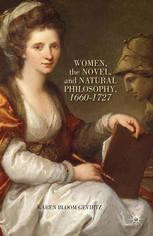
Women, the Novel, and Natural Philosophy, 1660–1727 PDF
Preview Women, the Novel, and Natural Philosophy, 1660–1727
Women, the Novel, and Natural Philosophy, 1660–1727 This page intentionally left blank Women, the Novel, and Natural Philosophy, 1660–1727 Karen Bloom Gevirtz WOMEN, THE NOVEL, AND NATURAL PHILOSOPHY, 1660–1727 Copyright © Karen Bloom Gevirtz, 2014. Softcover reprint of the hardcover 1st edition 2014 978-1-137-38920-6 All rights reserved. First published in 2014 by PALGRAVE MACMILLAN® in the United States— a division of St. Martin’s Press LLC, 175 Fifth Avenue, New York, NY 10010. Where this book is distributed in the UK, Europe and the rest of the world, this is by Palgrave Macmillan, a division of Macmillan Publishers Limited, registered in England, company number 785998, of Houndmills, Basingstoke, Hampshire RG21 6XS. Palgrave Macmillan is the global academic imprint of the above companies and has companies and representatives throughout the world. Palgrave® and Macmillan® are registered trademarks in the United States, the United Kingdom, Europe and other countries. ISBN 978-1-349-48230-6 ISBN 978-1-137-38676-2 (eBook) DOI 10.1057/9781137386762 Library of Congress Cataloging-in-Publication Data is available from the Library of Congress. A catalogue record of the book is available from the British Library. Design by Newgen Knowledge Works (P) Ltd., Chennai, India. First edition: March 2014 10 9 8 7 6 5 4 3 2 1 For Naomi, Ben, and Stephen This page intentionally left blank Contents Acknowledgments ix Introduction 1 One Notions of the Self 15 Two An Ingenious Romance: The Stable Self 35 Three The Fly’s Eye: The Composite Self 71 Four The Detached Observer 101 Five The Moral Observer 127 Conclusion 167 Notes 173 Bibliography 217 Index 239 This page intentionally left blank Acknowledgments Thanking the many people who have made this book possible is one of the great pleasures of such a project. It gives me considerable sym- pathy for my authors, who in their different ways rejected the notion of isolated genius and recognized that the interaction between indi- vidual and context is necessary to creation. The cover image, “Self-portrait” (“Selbstbildnis”) by Angelika Kauffmann (1780–81), is used with permission of the Bundner Kunstmuseum Chur. I wish to thank Nicole Seeberger for guiding me through the process with the museum. Parts of chapter 2 appeared in “Aphra Behn and the Scientific Self,” in The New Science and Women’s Literary Discourse: Prefiguring Frankenstein, edited by Judy Hayden (2011, Palgrave Macmillan) and are reproduced with permission of Palgrave Macmillan. Seton Hall University provided resources that enabled the comple- tion of this study. Dr. Larry Robinson, Provost of Seton Hall University, granted a sabbatical. The University Research Council awarded a sum- mer stipend and then-Interim Dean Joan Guetti secured additional funding for travel. Mary Balkun, Chair of the English Department and the members of the English Department provided funding and approved time for my research. Rebecca Warren, Department Secretary, offered good cheer and administrative support. A number of colleagues at Seton Hall have also been integral to my work. Dermot Quinn and James McCartin (now at Fordham University) inspired me with their erudition and love of learning; they made Bacon, Hobbes, and Locke wondrous and thrilling. Anthony Lee, Marta Deyrup, Lisa Rose-Wiles, Martha Loesch, and Mabel Wong at Walsh Library exemplify generosity, resourcefulness, and determination. Jonathan Farina, Donovan Sherman, and Angela Weisl heroically read chapters and offered keen commentary and suggestions. Last but far from least, thanks to Anthony Sciglitano, Williamjames Hoffer, Amy Hunter, and James P. Kimble. I am grateful to many colleagues beyond Seton Hall. Rupert Baker, Library Manager at The Royal Society, provided thoughtful, invalu- able assistance. The librarians at the University of Chicago Library and the New York Public Library, including the Rare Books and Manuscripts Division, were helpful and kind. Maureen Duffy, Rachel
